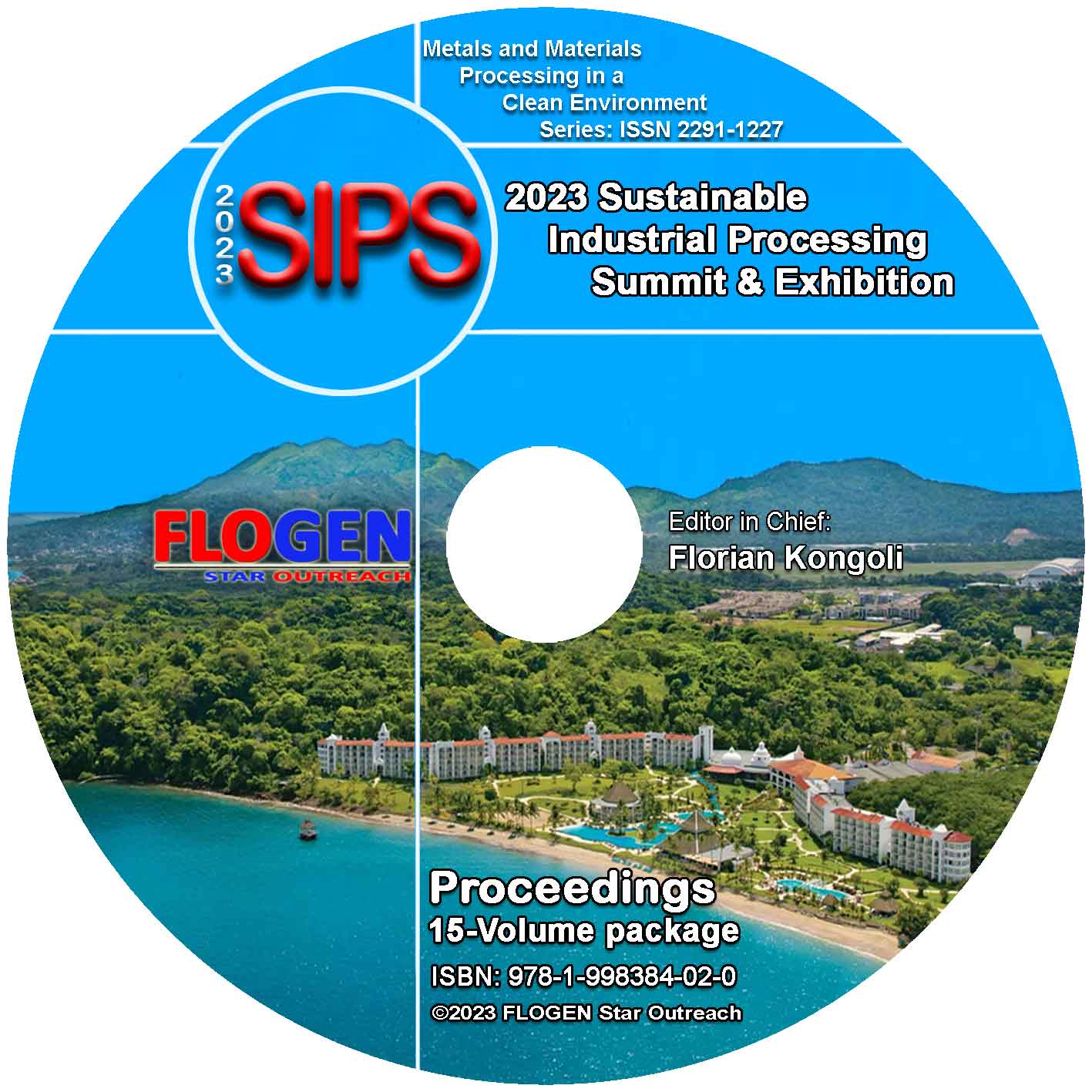2023-Sustainable Industrial Processing Summit
SIPS2023 Volume 14. Intl. Symp on Electrochemistry, Molten Salts, Corrosion and Recycling
| Editors: | F. Kongoli, R. Fehrmann, V. Papangelakis, I. Paspaliaris, G. Saevarsdottir, G. Kipouros, R. Singh, F. Wang, D. Macdonald, R. Gupta, M. Barinova, F. Ahmed, H. Ozgunay, K. Tang, N.N. Thanh, C. Gaidau, K. Kolomaznik |
| Publisher: | Flogen Star OUTREACH |
| Publication Year: | 2023 |
| Pages: | 114 pages |
| ISBN: | 978-1-989820-98-8 (CD) |
| ISSN: | 2291-1227 (Metals and Materials Processing in a Clean Environment Series) |

CD shopping page
NEW BIOMATERIALS MADE BY DIFFERENT ORIGIN GELATINS FOR SKIN WOUND HEALING
Carmen Gaidau1; Maria Rapa2;1R&D NATIONAL INSTITUTE, Bucharest, Romania; 2POLITEHNICA UNIVERSITY OF BUCHAREST, Bucharest, Romania;
Type of Paper: Regular
Id Paper: 93
Topic: 7
Abstract:
Skin is the most vulnerable organ to different kinds of injuries due to its large surface and potential for exposure to biological, mechanical, thermal, and radiation factors. In this context, the demand for innovative biomaterials for chronic wounds, skin burns, or skin disease treatment is high [1].
Collagen is a consecrated biomaterial for different skin wound healing formulations like powders, creams, films, hydrogels, and microspheres, due to high biocompatibility and non-toxicity as compared to synthesis polymers [2]. Recent research reported the advanced efficiency of gelatin and collagen hydrolysate in wound healing as compared to native collagen [1], due to the more available peptides and binding sites for the regeneration mechanism in the wound healing process.
The presentation will explore the potential of gelatins of different origins extracted from bovine and donkey hides, rabbit skin or fish scales to be processes as collagen nanofibers with preserved bioactivity and high efficiency in skin restoration due to the scaffold structure with increased surface area-to-volume ratio as compared to gelatin [3-7].
The main properties of these gelatins such as dry substance, ash and protein content, conductivity, viscosity, and molecular weight will be presented in connection to spinnable properties in view of manufacturing collagen nanofibers for new biomaterials used in wound healing.
The electrospinning parameters for fabrication of wound healing mats based on gelatins of different origins will be presented and the influence of solvents will be highlighted. The antimicrobial properties were improved by adding active substances from essential oils to metal and oxide nanoparticles. Coaxial electrospinning was used for volatile essential oils encapsulation and slow release in interaction with skin wounds.
The properties of collagen nanofibers manufactured from different gelatins will be presented in connection with their specific structure and origin: size dimension and morphology (SEM), surface composition (EDX), antioxidant properties, phenol releasing, cytotoxic concentrations, in vivo biocompatibility, and antimicrobial properties.
Finally, the behavior of gelatin nanofibers as compared to gelatins to preservation treatments by different gamma radiation doses will be discussed.
Different gelatin nanofibers successfully fabricated from different raw materials showed the huge potential for biomaterials innovation as compared to the use of classical native collagen in skin wound healing.
Keywords:
Material; Recycling; Sustainability; Technology; Wastes; gelatin, gelatin nanofibers, wound healing, nanofibers properties, by-products valorizationReferences:
[1] Prelipcean, A.-M.; Iosageanu, A.; Gaspar-Pintiliescu, A.; Moldovan, L.; Craciunescu, O.; Negreanu-Pirjol, T.; Negreanu-Pirjol, B.; Mitran, R.-A.; Marin, M.; D’Amora, U. Marine and Agro-Industrial By-Products Valorization Intended for Topical Formulations in Wound Healing Applications. Materials 2022, 15, 3507. https://doi.org/10.3390/ma15103507[2] Deaconu, M.; Prelipcean, A.-M.; Brezoiu, A.-M.; Mitran, R.-A.; Isopencu, G.; Matei, C.; Berger, D.Novel Collagen-Polyphenols-Loaded Silica Composites for Topical Application. Pharmaceutics 2023, 15, 312. https://doi.org/10.3390/pharmaceutics15020312
[3] Maria Râpă , Traian Zaharescu, Laura Mihaela Stefan, Carmen Gaidău,*, Ioana Stănculescu ,*, Rodica Roxana Constantinescu and Maria Stanca, Bioactivity and Thermal Stability of Collagen–Chitosan Containing Lemongrass Essential Oil for Potential Medical Applications, Polymers 2022, 14, 3884, https://doi.org/10.3390/polym14183884
[4] Maria Râpa , Carmen Gaidau2,* , Liliana Mititelu-Tartau , Mariana-Daniela Berechet , Andrei Constantin Berbecaru, Irina Rosca, Aurica P. Chiriac , Ecaterina Matei, Andra-Mihaela Predescu, Cristian Predescu, Bioactive Collagen Hydrolysate-Chitosan/Essential Oil Electrospun Nanofibers Designed for Medica lWound Dressings, Pharmaceutics 2021, 13, 1939, https://doi.org/10.3390/pharmaceutics13111939
[5] Ecaterina Matei, Carmen Gaidau, Maria Râpă, Laura Mihaela Stefan, Lia-Mara Ditu ,
Andra Mihaela Predescu , Maria Stanca , Mircea Cristian Pantilimon , Daniela Berechet , Cristian Predescu and Anamaria Mosutiu, Sustainable Coated Nanostructures Based on Alginate and Electrospun Collagen Loaded with Antimicrobial Agents, Coatings 2021, 11, 121, https://doi.org/10.3390/coatings11020121
[6] Ecaterina Matei, Carmen Gaidau2*, Maria Râpă1*, Roxana Constantinescu, Simona Savin, Mariana Daniela Berechet, Andra Mihaela Predescu, Andrei Constantin Berbecaru, George Coman, Cristian Predescu, Sustainable Rabbit Skin Glue to Produce Bioactive Nanofibersfor Non-Active Wound Dressings, Materials 2020, 13(23), 5388; https://doi.org/10.3390/ma13235388
[7] Maria Râpă , Carmen Gaidău*, Laura Mihaela Stefan, Ecaterina Matei, Mihaela Niculescu, Mariana Daniela Berechet, Maria Stanca, Cristina Tablet, Mădălina Tudorache, Raluca Gavrilă, Cristian Predescu, Ruxandra Vidu, New Nanofibers based on Protein By-Products with Bioactive Potential for Tissue Engineering, Materials 2020, 13(14), 3149; https://doi.org/10.3390/ma13143149